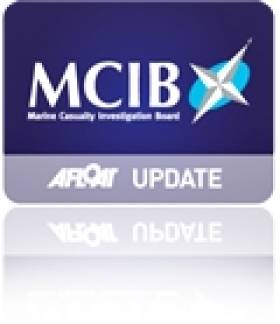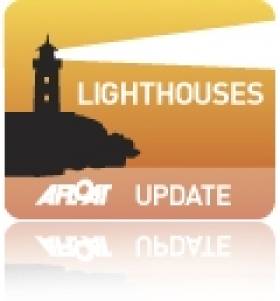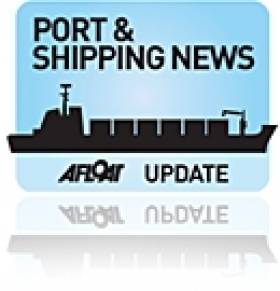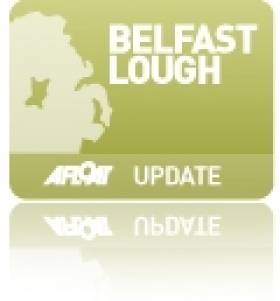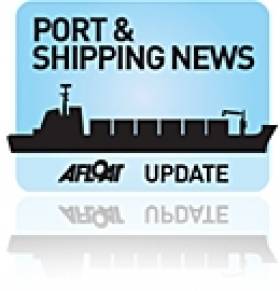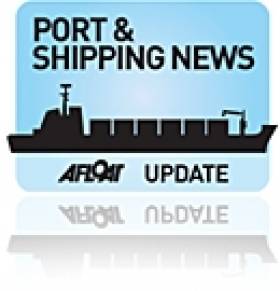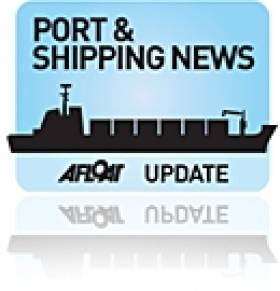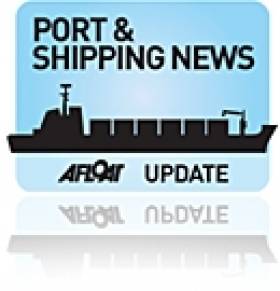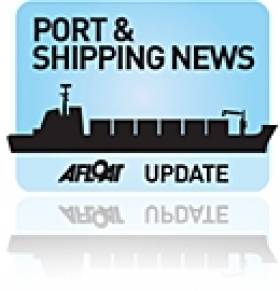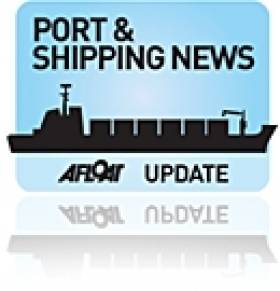Displaying items by tag: Shipping
Poor Navigation Standards On Container Ship Grounded On Arklow Bank Says MCIB Report
#MCIB - Lack of adherence to standard navigation procedures led to the grounding of a German-owned container ship on the Arklow Bank in January this year, according to the official report into the incident.
As previously reported on Afloat.ie, the MV Arslan II - which was sailing to Belfast from Turkey with a 4,000mt cargo of steel products - was dry-docked at Dublin Port after damaging her rudder on the sandbank some six miles off the Wicklow coast on 14 January.
A familiar visitor to the Irish Sea for more than two decades, mostly under her former name Coastal Isle, the ship was held in Dublin for more than two months while investigators from the Maritime Casualty Investigation Board (MCIB) examined all aspects of the vessel and the circumstances surrounding her grounding.
Their report is highly critical of the management of the 89m cargo ship, noting among other things that a stability calculation was not prepared on departure from her first port of call at Ceuta on the Strait of Gibraltar. Neither were her departure drafts or freeboard recorded in the ship's official log.
Stability proved to be an issue on the voyage, with a copy of the plan in force at the time of the incident showing the master's concerns at the vessel's heavy rolling even in even Force 4 winds.
Weather forecasts of Force 6 to 7 winds prompted the ship's master to alter course on approach to the Arklow Bank in the Irish Sea, seeking shelter from the coast.
But via a combination of outdated charts and incorrect tide tables, over-reliance on GPS over visual navigation cues, and miscommunication between deck officers, the Arslan II passed the southern marker buoy on the wrong side and grounded on the south end of the sandbank.
The MCIB took the ship's master to task for failing to report the grounding incident to the Irish Coast Guard, instead chartering her own tug to tow the vessel to the nearest available port large enough to accommodate her, which was Dublin.
In addition, investigators discovered that this was the second grounding incident for the vessel, following an incident in Scottish waters on the Isle of Bute in July 2012.
The full MCIB report is available to download below.
Minister Welcomes Arrangements With UK Over Ships’ Light Dues
#Lighthouses - Minister for Transport, Tourism and Sport Paschal Donohoe today announced an agreement with his UK counterpart Minister John Hayes for light dues paid by ships coming into ports in Ireland and the United Kingdom from April 2015.
Light dues fund the aids to navigation – lighthouses, buoys, beacons and radio aids – operated by the Commissioners of Irish Lights (CIL) in Ireland, and by Trinity House and the Northern Lighthouse Board in the UK.
The three lighthouse authorities, their integrated working arrangements and the single operating system for light dues represents a long-standing co-operation between Ireland and the United Kingdom.
A joint Ireland-UK consideration of the light dues system has resulted in an agreement to maintain the single light dues operational area and to improve the collection and enforcement system for light dues.
This will be of particular benefit to the CIL in relation to light dues payable at Irish ports.
“I welcome this agreement, as I believe the single light dues area has worked well over many years, particularly for the shipping sector," said Minister Donohoe. "It also avoids the need to pay light dues separately in Ireland and the UK, which would have imposed additional costs on shipping on Ireland-UK routes.
"To keep this arrangement in place it is of course important that the shipping sector plays its part in paying its liabilities for light dues promptly. The Commissioners of Irish Lights play a vital maritime role in providing aids to navigation from which the shipping sector benefits, and light dues are a key element of CIL’s funding.”
The minister also referred to CIL’s success in implementing its strategic and operational restructuring programme and in reducing its operational costs by more than 30% over five years.
“CIL has shown its ability to operate as an efficient and dynamic organisation. The agreed arrangements will be in place for a trial period up to March 2018, and monitored for their cost-effectiveness and sustainability.
"I can confirm that the Irish light dues rate will remain at €0.60 per net registered tonne for CIL’s upcoming fiscal year from Apr 2015 to Mar 2016.
"As part of my commitment to CIL and to maritime safety, my department will continue to contribute towards CIL’s costs during the trial period up to March 2018.”
Irish Shipping Volumes Up 2% During Q2 2014
#shipping – Irish shipping and port activity rose by 2% in the second quarter of 2014 when compared to the corresponding period of 2013, according to the latest quarterly iShip Index* published today by the Irish Maritime Development Office (IMDO).The latest analysis also indicates that four of the five principal freight segments grew in the second quarter of 2014.
The Roll on/roll off freight segment experienced volume growth of 7% in the second quarter to 244,629 units and is the sixth consecutive quarterly increase in freight trailers. The majority of Roll on/roll off traffic moves between Ireland and Great Britain and this freight segment is a simple but reliable indicator of the level of trade between both economies.
Container traffic (lift on/lift off) grew by 5% to 154,725 units. Encouragingly container imports have now risen for three consecutive quarters; Q4 2013 +3%, Q1 2014 +6% and Q2 2014 +7%. Container exports continued to growth increasing by 2%. Container operators have noticed a significant increase in deep sea traffic from Asia since the beginning of the year which bodes well for domestic consumption in the coming quarter.
The overall bulk traffic segment saw tonnage volumes decline by 8% when compared to the previous year. Break bulk, which largely consists of imports of construction and project related commodities, increased by 34%. Break bulk has now seen four consecutive quarterly increases.
Note: *The iShip index is a volume index for all freight traffic moved to and from the Republic of Ireland. This does not include passengers, and transshipment activity. Note: All freight and passenger comparisons are done on a quarterly basis (Q2 2013 v Q2 2014)
Record Trading As Profits Soar At Belfast Harbour
#Belfast - Belfast Harbour is reporting a profit of £26 million (€32 million) in 2013, a whopping 42% rise on the previous year.
The Belfast Telegraph reports that a record increase in the trade of coal, stones, scrap and animal feed fuelled the Belfast Lough port's growth in the 12 months of 2013.
And with more than £60 million (€74 million) committed to future projects for the port, such as wind energy and developing its cruise tourism potential, it's expected the port will see its growth continue in the years to come.
The Belfast Telegraph has more on the story HERE.
Video Of Grounded Cargo Ship At Drogheda Port
#ArklowRuler - TheJournal.ie has shared this video of the cargo ship Arklow Ruler as it found itself stuck at the mouth of the River Boyne at Drogheda Port.
Thankfully the 80-metre freighter poses no immediate danger and is carrying ho hazardous cargo - though attempts to free her at high tide have so far been unsuccessful, causing much frustration for port officials and the Arklow Ruler's crew of eight.
It comes three-and-a-half years after another cargo ship from the same company, the Arklow Raider, ran around on a sandbank in the same area. The MCIB report on that incident was published in October 2012.
3% Increase For Irish Port and Shipping Volumes In 2013
#Ports&Shipping - The volume of cargo shipped through Irish ports saw an overall increase of 3% in 2013, with three of the five principle freight segments experiencing growth.
This is according to the 11th annual edition of the Irish Maritime Transport Economist publication.
Irish Maritime Development Office director Liam Lacey commented that the increase gives "cause for greater optimism than has been the case in recent years.
"The volume of trade that moves through Irish ports is a reliable indicator of national economic performance and activity," he added.
“Although traffic through Irish ports has not returned to the levels that were recorded prior to the recession, it is noteworthy that the iShip Index, which is an aggregate measure of trade volumes, rose to 862 points for 2013, up 3% on the previous year."
Within this increase, figures show that Ro/Ro volumes rose by 6% buoyed by transfers from the Lo/Lo mode, while dry-bulk traffic also grew by 6%, resulting mostly from an increased demand for animal feed and coal.
“Additional demand for construction-related materials contributed to break-bulk traffic growing to 961,803 tonnes, up 20% on the previous year," said Lacey, who added that while liquid-bulk and Lo/Lo traffic fell by 14% and 1% respectively, these decreases in volume were caused by market anomalies rather than a reduction in total demand.
Meanwhile, within the tourism sector, Irish ports "continued to capitalise on the global rise in cruise business over the last decade, as vessel calls to the island of Ireland rose to 277 during 2013.
"In this category, the majority of visitors came from North America, Britain and Germany," said Lacey.
Ferry tourism, encompassing services between the Republic of Ireland and Great Britain, also showed an increase of 1% to 2.33 million passengers. "This increase marks an important turning point as growth returns to a market segment that has been in decline since 2010," said the IMDO director.
As for the first four-plus month of 2014, Lacey said preliminary figures "suggest that the trends in the maritime transport sector that were observed in 2013 have continued and that a degree of cautious optimism is justified.”
Commenting on the report, Minister for Transport Leo Varadkar said he welcomed initiatives being undertaken by Ireland's ports "to provide the additional capacity that will be needed as our economy continues to recover and expand.
"I also welcome recent increases in shipping capacity and the development of new trade routes. These developments auger well for economic growth and are supportive of the objectives of the National Ports Policy and the Government’s plan for National Recovery 2011-2016.
"As reported in the IMTE, the international shipping environment remains challenging. Nonetheless, we have begun to see signs of recovery in the Irish maritime sector, as evidenced by the growth in trade, through Irish ports in 2013.”
#Shipping - A cargo ship captain has been fined by Cork District Cork over failing to immediately inform the Irish Coast Guard of engine difficulties suffered by his vessel late last month.
As the Irish Examiner reports, the Department of Transport, Tourism and Sport brought the case against Turkish national Mehmet Kaya, captain of the 140m Begonia G that was travelling from Foynes to the Port of Cork with its fertiliser cargo on the evening of 27 February when it lost engine power in poor weather some eight miles off Baltimore.
The court hard that the vessel began to drift towards shore, but Valentia Coast Guard was only made aware of the incident independently some two hours after it began.
Kaya's solicitor entered a guilty plea on the charge of breaching a vessel traffic directive in not informing the coastguard of his ship's loss of manoeuvrability.
The Irish Examiner has more on the story HERE.
Irish Shipping Volumes On the Rise
Irish shipping and port activity rose by 3% in the third quarter of 2013 when compared to the corresponding period of 2012, according to the latest quarterly iShip Index and quarterly traffic review published today by the Irish Maritime Development Office (IMDO). The iShip index recorded 832 points for the third quarter (3rd Quarter 2012: 810) and increased by 6% over the first 9 months of 2013. The latest analysis also indicates that three of the five principal domestic freight segments grew in the third quarter of 2013.
The largest share of growth in the third quarter was driven by the Ro-ro sector, growing by 8% to 224,954 freight trailers. The majority of roll-on/roll-off traffic moves between Ireland and Great Britain, our largest trading partner. This trade grew by 7% as trade conditions in the UK continued to improve. The increase in this sector was further helped by a stronger performance in direct continental volumes (up 14%).
Container traffic (lift on/lift off) declined by 2% to 149,423 units. The container market continued to struggle during the third quarter as sluggish demand in advanced economies constrained growth. This sector is a key distribution channel for Irish trade to Europe and to long-haul markets, including Asia and US. Exports, as a subset of the total container volume, declined by 3% while imports declined by 1%.
Dry bulk shipments, which make up the largest volume of traffic throughput at Irish ports, was flat during the third quarter of 2013. Liquid Bulk showed a 4% increase while break bulk increased by 44% due mainly to increased demand for construction related materials such as wood, and specialised machinery, however volumes remain at historically low levels.
Commodity exports such as dairy products, waste paper and iron & steel grew in the third quarter while imports of road vehicles, wood and beverages also increased.
Giant Antarctic Iceberg Poses Threat To Shipping
#Shipping - Shipping routes south of the Equator could be threatened by a giant iceberg the size of New York's Manhattan Island that's broken off a glacier in Antarctica.
BBC News reports that a British research team has been tasked with tracking the massive ice floe, which broke free from the Pine Island Glacier in July and is now drifting in the Southern Ocean between New Zealand and Chile.
A previous iceberg in the same area drifted into the Drake Passage between Cape Horn and the South Shetland Islands, and if the new discovery took the same trajectory it could pose a serious threat to international shipping lanes.
BBC News has much more on the story HERE.
Irish Shipyard Wins Big in UK Offshore Wind Sector
#newships – Arklow Marine Services, the shipbuilding yard owned and managed by the Tyrrell family, is celebrating the successful completion of a €2.3m order with the launch of a vessel for use in the development of UK offshore wind farms. The Gardian 18, is the third such vessel which the Arklow business has delivered to Alicat a subsidiary of UK offshore wind specialists Gardline , in the last three years.
The Gardian 18 can carry 12 personnel & 2 crew and is fitted with twin MAN main engines each developing 1000 BHP and is coupled to Rolls Royce water jets that will give the vessel a sprint speed of 30 knots and a service speed 25 knots. Gardian 18 has a range of 800 nautical miles.
Arklow Marine Services carries on the proud tradition of shipbuilding in Arklow having commenced trading in 1864 and celebrates 150 years in existence next year in 2014. The Tyrrell name remains synonymous with shipbuilding in Arklow and today the company is led by Directors Billy – Naval Architect & John – Marine Engineer. The company currently employs 30 local people and supports employment with other contractors in the region.
The Gardian 18 was built on-schedule and on-budget over a 30 week period. Among the skills involved in the construction were design and draftsmanship, machining, aluminium fabrication, welding, hydraulic engineering, mechanical engineering, electrical engineering pipe fitting, engine alignment, plumbing, glazing, carpentry, painting, sign writing and cranage. The management of the company would like to acknowledge and thank their excellent workforce whose expertise and strong work ethic which allows them to deliver quality vessels on time every time.
Arklow Marine Services Director Billy Tyrell spoke of the potential for the company to benefit from the development of renewables on both sides of the Irish Sea;
"Over the last number of years Arklow Marine Services has developed a reputation for delivering high performance vessels for the renewable industry. Offshore wind is a rapidly growing sector in the UK and we are well positioned to take advantage of that market. Hopefully, we will see similar development in Irish offshore projects. This can deliver jobs for coastal towns like Arklow and businesses like Arklow Marine Services. We are delighted to continue our partnership with Gardline and look forward to working more closely with them as their business grows."
The United Kingdom is in the process of developing 33 GW of offshore wind energy over the next decade. That is an amount seven times the total electricity demand in Ireland. There is a further 2.5 GW of offshore wind in development on the Irish Side of the Irish Sea. The National Offshore Wind Association has estimated that a supply chain of up to €60bn exists in the Irish Sea Zone.
Brian Britton of the National Offshore Wind Association welcomed this latest contract win for Arklow Marine Services;
Arklow Marine Services is an example of how quality Irish companies can compete for supply chain opportunities that offshore wind development presents. They have already won a significant position in the UK market. We believe that with the development of Irish projects, companies like Arklow Marine Services will generate a significant employment boost for the Irish economy.
Gardline specialise in supporting the deployment, operation and maintenance of offshore wind farms. The Gardian 18 will enter service in late November. This vessel will principally be used to deliver service personnel to the offshore wind farms. The nature and design of offshore turbines necessitates vessels of high specification and unique design suitable for servicing them.
Gardline Managing Director, Steve Thacker explained the reason for partnering with Arklow Marine;
We are delighted to partner once more with Arklow Marine Services for the development of another bespoke vessel for our fleet. We operate in the toughest of conditions. Our customers demand reliability from us and we require vessels which deliver that and which meet the highest standards of safety. The Gardian 18 is the latest in a series of vessels from Arklow for Alicat and is currently for sale, which is an advantage of not having to fund the vessel whilst under construction and is ready to go straight to work



























